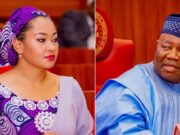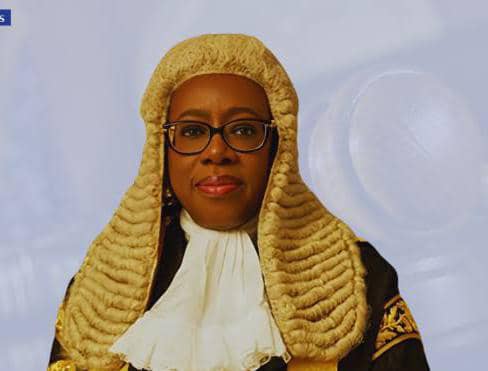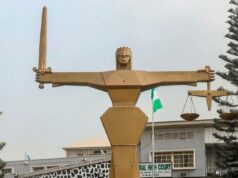Picture of CJN, Kekere-Ekun
Tension is rising within Nigeria’s judiciary as the National Judicial Council (NJC) prepares to convene a critical meeting to review allegations of judicial misconduct.
The meeting, which will be the NJC’s first quarterly session under the leadership of Chief Justice of Nigeria (CJN) Kudirat Olatokunbo Kekere-Ekun, is expected to take place soon after the CJN returns from an official assignment abroad.
The session, which will be the final one for the year, will address the findings of several NJC committees investigating 55 petitions lodged against judicial officers across the country.
The NJC, empowered by the 1999 Constitution to appoint, promote, and discipline judges, has stirred concern among members of the judiciary, particularly following recent statements from the new CJN that errant judges will face severe consequences.
The Chief Justice is reportedly determined to restore the integrity of the judicial system, which has been criticized for perceptions of corruption and misconduct.
Between May and August 2024, a total of 22 petitions were filed against 27 judges in both federal and state high courts.
These complaints were sent to the NJC’s Preliminary Complaints Assessment Committee for review.
Most of the petitions were dismissed for lacking merit, being abandoned, or being subjudice, as some issues were still pending in higher courts.
A separate set of eight panels, set up in June 2024, continued investigating claims against other judicial officers, while four more panels were established in August to examine cases where prima facie evidence of misconduct had been found.
Currently, 12 petitions are still under investigation, involving a number of judicial officers from the Court of Appeal and state high courts.
Judges facing these allegations have been given the opportunity to defend themselves, both in writing and orally, with legal representation if desired.
Sources within the NJC say that the final meeting will be crucial in shaping the future of the judiciary, as the new CJN plans to take decisive action based on the panels’ reports.
Although some judges, including the Chief Judge of a state high court, requested extensions to respond to the allegations, the NJC has emphasized that the process cannot be delayed further.
Adding to the pressure on the judiciary, senior legal figures have raised concerns over recent controversies, particularly conflicting court orders related to elections in Rivers State.
The situation has highlighted the growing concerns over the misuse of judicial power, with respected legal figures such as Chief Mike Ahamba, SAN, and Prof Awa Kalu, SAN, questioning the jurisdiction of federal courts in matters traditionally under the purview of state courts.
Some have called for a firm response from the NJC, arguing that failure to act decisively risks further undermining the credibility of the judiciary.
Notably, the controversy over conflicting court orders issued by two judges—Justice Peter Lifu of the Federal High Court and Justice Chigozie Igwe of the Rivers State High Court—has sparked outrage among legal professionals.
The orders, which related to the scheduling of local government elections in Rivers State, have raised questions about judicial integrity, with critics accusing the courts of being manipulated for political purposes.
Prof Chidi Anselm Odinkalu, former chairman of the National Human Rights Commission, and other legal practitioners have lamented the increasing politicization of the judiciary, with some suggesting that judges are now more interested in issuing rulings that benefit powerful political interests rather than upholding the rule of law.
These concerns are compounded by incidents in which courts, particularly at the federal level, have interfered with state matters, as seen in the recent judicial actions involving the Kano emirship dispute and the Rivers State elections.
With the NJC set to convene soon, there is growing pressure on the council to take swift and strong action against judges found guilty of misconduct.
Legal experts argue that the integrity of the judiciary can only be restored if the NJC takes decisive steps to hold errant judges accountable, including potential sanctions such as dismissal or retirement.
The hope is that the new CJN will lead a reformation of the judicial system, ensuring that the judiciary remains an independent and credible branch of government.
As the NJC prepares to consider the reports of its investigative panels, the future of many judges hangs in the balance, and the judiciary’s ability to restore public confidence may depend on the outcomes of this crucial meeting.

















